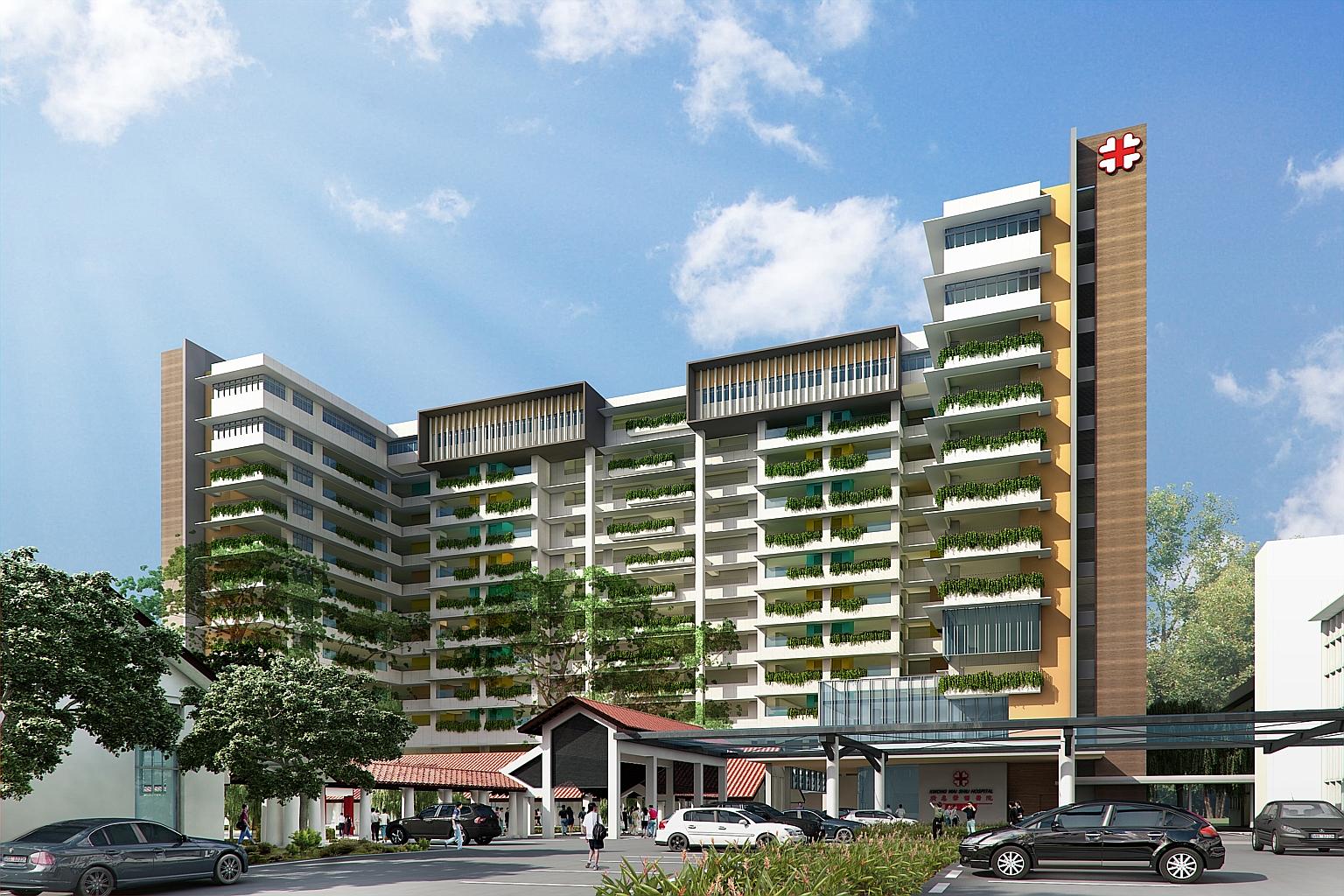Kwong Wai Shiu undergoes $96m transformation to become Singapore's largest nursing home
Last of six buildings torn down to make way for 12-storey hub for elderly and community
Sign up now: Get ST's newsletters delivered to your inbox

The plan is to have a one-stop suite of services for seniors at the new Kwong Wai Shiu Hospital community hub (above) by 2017. The space will also be open to the community to use. Members of the public will be able to have meals in its foodcourt, go for health screening or do some shopping at its retail spaces.
PHOTO: KWONG WAI SHIU HOSPITAL
Janice Tai
Follow topic:
Construction of what will be Singapore's largest nursing home started last month in Serangoon Road.
The Kwong Wai Shiu Hospital will undergo a $96 million transformation to become an integrated hub for the elderly and the community in two years' time.
The last of the six buildings slated for demolition was torn down last week and a new 12-storey building, that will double the hospital's number of beds to 622, will be built.
This move is part of a national plan to raise the capacity of nursing homes in Singapore as the country copes with an ageing population.
Work on at least seven new nursing homes started this year and the plan is to raise the number of nursing home beds to 17,150 by 2020, up from about 10,000 now.
-
Nursing homes in the pipeline
Work on at least seven new nursing homes began this year as part of a plan to ramp up the supply of such facilities across Singapore.
For instance, an 11-storey, 342-bed home in Chai Chee Street is expected to be built by the end of next year. It will be run by NTUC Health Co-operative. Another 236-bed facility in Geylang East Central, slated to be ready in 2017, will also be operated by NTUC.
Voluntary welfare organisation Thye Hua Kwan Moral Society will run a 290-bed home in Hougang. Construction will be completed next year.
Other areas lined up for new nursing homes include Ang Mo Kio Avenue 8 and Choa Chu Kang North 6. The Ministry of Health will build the facilities, but some will be leased out later to healthcare operators to run.
The ministry said last year that it may also run three to four of its own nursing homes to better understand the issues faced by operators, and come up with solutions and innovations in eldercare which can be adopted by others.
While new ones are being built, some existing nursing homes, such as Kwong Wai Shiu Hospital, are due for expansion. Ju Eng Home in Jalan Kayu, which now cares for 334 patients, will be expanded to a 584-bed facility by June next year.
So, by 2017, the Kwong Wai Shiu Hospital community hub will house a bigger nursing home and senior care centre, as well as both traditional Chinese medicine (TCM) and Western medical clinics. Home care and hospice services will also be offered.
The plan is to have a one-stop suite of services for seniors. For example, an elderly person who has been discharged from the nursing home can go to the TCM clinic for acupuncture or do rehabilitation exercises at the senior care centre.
Those in the neighbourhood who consult doctors there can also be referred for home care or respite care services. "This one-stop concept allows for better coordination and synergy in managing cases in the community. Services for the elderly will also be more accessible," said its CEO, Dr Ow Chee Chung.
"Instead of having the traditional nursing home which is gated, we want to open the space to the community to use," he added.
So, the public will be able to have their meals in its foodcourt, go for health screening or do some shopping at its retail spaces. This is because the hospital is bringing in community partners to offer their services on-site.
The nursing home will also have new features such as specialised dementia and neurology care wards.
Each ward will come with a "haze management zone", which has enclosed cubicles equipped with a ventilation system for the comfort of patients who may have breathing problems during the haze period.
Dementia patients will have a garden on the third storey to stimulate their senses, and a "memory street" on every floor designed after old places or times to help them reminisce and jog their memories.
Dr Ow said these features were deliberately planned to help patients feel at ease in a 12-storey facility.
He said: "Land is scarce in Singapore and, unlike in the old days when nursing homes tended to be single- or double-storey and the elderly could wander around outside, today nursing homes are being built higher and higher.
"We are concerned about patients' social well-being, so we try to maximise the space we have."
The hospital's existing three-storey building, which has served as its facade since 1960, will be conserved to house retail outlets, a foodcourt and private wards. The other three single-storey colonial buildings now surrounding a Chinese pavilion - built in 1958 - will also be kept for a heritage museum and other uses.
The hospital currently sits on a 26,000 sq m site. The remaining old buildings are gone and the 10,000 sq m land area they occupy will be returned to the Government.
The redevelopment project is undertaken jointly with the Ministry of Health and the Government will pay the bulk of the costs.
Correction note: An earlier version of this report incorrectly stated that a home in Chai Chee Street is expected to be built by the end of this year. It should be by the end of next year. We are sorry for the error.

